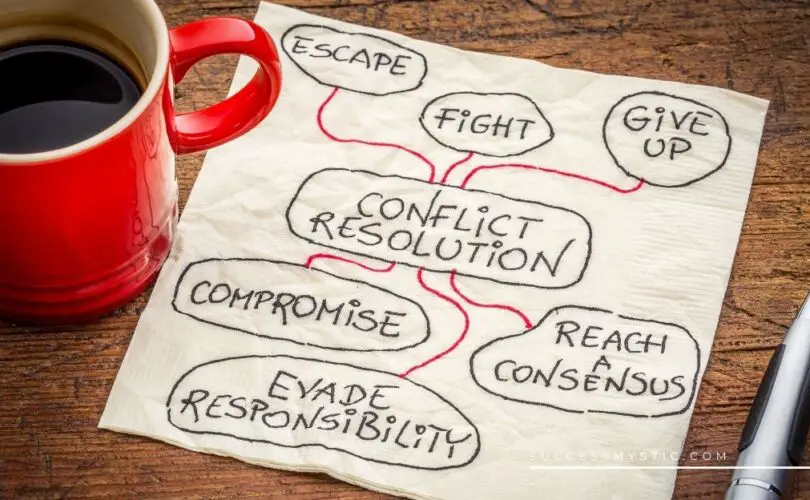In this article: How to find peaceful solutions and effectively resolve your disagreements.
Conflicts Are Common
In any situation, when you put two people together there are very likely going to be conflicts. Conflicts arise from differences in values, opinions, and needs. Our needs and motivations begin by the need to substantially provide ourselves with shelter, food, and comfort. From there we seek safety, employment, and personal security. Soon, once we’re reasonably comfortable we look for social acceptance and belonging.
This includes building social networks to maintain our comfort, security, and safety. It also includes looking for a mate or joining social networks to provide us with our next motivations. We look for ways of providing ourselves with respect, self-esteem, and eventually we seek self-actualization. “Abraham Maslow used the term self-actualization to describe a desire, not a driving force, that could lead to realizing one’s capabilities.” (ref.)
According to Maslow, as we humans move up the pyramid and meet each of our needs, we only need to substantially meet a need before moving on. This is important to have at least a basic understanding of because it’s when our motivations and needs are threatened that we find ourselves in conflict.
This can happen when your social needs are being threatened by something like partner poaching, or it can be a threat to your safety and security when a co-worker causes your position at your job to be threatened. Neighbors often find themselves in conflict over opposing views of territory. For some reason, neighbors in conflict may find themselves fighting over the length of grass that’s not been mowed, or the fact that one neighbor put in solar panels without getting the approval of an HOA.
It seems to activate the primal need to protect one’s territory, thereby protecting the value of your source of safety and security.
A romantic partnership can enter into a conflict when an outside party expresses interest in one of the members of that partnership. This threatens the members of the partnership by threatening their social acceptance, relationship, and perhaps their security.
For example:
Sharon and Dave have been married for four years. Before Sharon and Dave met, Sharon was dating Chris. However, after Sharon and Chris broke up, they remained friends. Dave was okay with this to a point, especially since Sharon’s friendship with Chris extended from before Dave and Sharon met. Plus, Chris was also in a committed relationship, so Dave pushed the threat Chris posed to his position in his marriage to the back of his mind.
Eventually, Chris and his fiancée broke up. Chris’s fiancée, Brandi, made it very public knowledge that the reason she and Chris broke up is because Chris is still in love with Sharon and won’t let go of his connection with her.
Dave begins to feel threatened by Chris’s continued presence in Sharon’s life. This creates conflict.
This particular situation has created more than one conflict.
- Dave and Chris are now in conflict because Dave feels threatened by Chris’s presence and relationship with Sharon.
- Chris and Brandi are now in conflict because she made a public spectacle of their break-up
- Sharon and Brandi may be in conflict. This is not known right away.
- Sharon and Chris may be in conflict. This will depend on Chris’s actual feelings for Sharon. Remember that so far, Brandi has merely made an unsubstantiated accusation.
Our emotions are engaged by what we choose to give attention to. The health of our ego is dependent on the balances and justifications for what we’ve invested our emotions in. That being said, any area of life where you’ve invested your ego is a potential problem area for conflict.
Arenas For Conflict
Conflict can arise in your interpersonal relationships as is the case for Sharon, Dave, Chris and Brandi. It can arise in your professional life between you and a co-worker, boss, or employee. It can even arise between you and a client or customer. Conflicts can arise between complete strangers, parents and their children, world leaders, and between businesses and the public.
Any number of people are averse to conflict for good and bad reasons. We constantly preach about harmony and world peace, that conflict should be avoided at all costs, and that conflict makes life too hard for many. However, there is a place where conflict exists and functions in our lives in a healthy way.
Conflict triggers our emotions because we invest stock in what motivates us to survivie and thrive. When those motivations are threatened, we begin to feel resentment, hatred, disappointment, and discomfort. When conflict is handled in a dysfunctional manner, not dealt with at all, ignored, or shelved it can lead to a stronger presence of those negative feelings.
Unfortunately, people who are averse to conflict are more often unaware of how to handle it properly. Many of us were taught by our parents, teachers, and religious leaders to bite your tongue and walk away lest you say or do something regretful. While that is wise advice, making a habit of using this a tool against your adversaries in conflicts only serves to cement feelings of resentment, hatred, and discomfort. Moreover, it creates irreparable rifts.
When conflict his handled properly and addressed in a healthy manner, at its full potential, it can lead to an increase in the way we understand the world around us, the people within our social networks, the motivations of those in our significant other matrices, build trust, and strengthen bonds. This is because of resilience.
Adversity creates resilience because of the way we learn. Our evolutionary predecessors didn’t evolve in a lab, in controlled environments, or in a fair world. We evolved as a species by growing stronger and smarter in our survival. We’re so resilient because only in recent history do, we see marks of a society that is not involved by the constant threat of death by starvation.
We learn through pain. We learn and grow through conflict. Believe it or not, the strongest relationships are bound together by unbreakable bonds that were formed by conflict. This is why conflict resolution is so important to every one of us.
Properly and healthfully navigating conflict can mean the difference between saving a friendship or losing a marriage; or finding world peace or watching the world burn.
Resolving Conflict Requires Certain Life Skills
- Managing stressful situations
- Building resilience
- Regulating your emotions
- Successful navigation of verbal and non-verbal communication
- Showing respect
Any kind of conflict is going to arise out of a stressful situation, because by its very nature conflict is stressful and agitating. In order to resolve any kind of conflict in your life or workplace you have to remain calm. Running away from every stressful situation because you can’t handle stress will only lead to cementing the resentment and anger that often arises from conflict.
Building your resilience is an important life skill for a lot of reasons. It’s useful in the workplace. It’s a tool you’ll need to have on hand if you want to grow professionally, spiritually, or personally. Also, it’s required in conflict.
It’s a very easy thing to experience adversity and run away from things as a result.
For example:
Misty has an American Staffordshire terrier. For those of you unfamiliar with this breed, it’s one of the five breeds of dogs often lumped in as being a dreaded pit-bull. It’s worth noting that there is actually no breed of dog that is specifically a “pit-bull.” The closest is the Irish or American Pit Bull Terrier, but these are two distinct breeds of dogs.
Anyway, Misty walks her dog around her neighborhood every day, up to five or six times a day. Deuce is a high energy dog as a terrier and so he requires a lot of exercise. For the most part, Misty’s neighbors really like Deuce. He may be an 85-pound behemoth, but he’s gentle with children, is great with other dogs big or small, and is generally well-behaved. He doesn’t pull toward strangers, nor does he jump up on people. Misty has put a lot of time, energy, and money into making sure that Deuce is better-behaved than your average dog.
This is precisely because he’s a pit-bull. It’s okay if the neighbors Golden Retriever jumps up on every human she gets close enough to, but it’s not okay for dogs of Deuce’s breed. Modern media has done an excellent job of unjustly vilifying certain breeds of dogs. Because of this, Misty’s neighbors have higher standards of behavior for Deuce than they do Misty’s neighbor with the golden retriever.
One day, Misty was walking Deuce as she normally does. One of the houses that have been on the market was recently bought, and the new neighbors are outside moving their stuff from the moving van to inside the house. The man of the house sees Deuce as he and Misty walks by, and he immediately reaches for a baseball bat just inside the cargo hold of the moving van. He makes an aggressive move toward Misty and Deuce, shouting at them as he does.
In this situation, Misty has several options. She can stand her ground. The state she’s has laws in place to protect her if she does. Or, she can give Deuce a command to double time his pace and move quickly away from the new neighbor. Both actions have consequences, and Misty has to balance them out in a split second.
In this particular case, Misty wasn’t willing to see Deuce threatened in that particular moment. She sped up their pace and retreated to the relative safety of her home. The problem is that this eventually created a scenario where the conflict was not resolved. Instead, the conflict cemented as such.
The next day, she was walking Deuce past that same house, as she’d done a thousand times before, and again that man was outside. Only this time, he was sitting on his front porch with a shotgun.
Just in case you’re curious, in this particular case, Misty was finally forced to call the police following a situation when the man chased after her and Deuce and grabbed a hold of her arm. In that particular incident, she sprayed him in the face with mace and immediately called 911. The man was arrested and charged with menacing and assault.
Healthy And Unhealthy Responses To Conflict
Unhealthy Responses
- Running away before any sort of resolution can be attempted
- Unwillingness or inability to respond to components of the conflict with the person you’re in conflict with
- Withdrawing love or affection
- Expecting bad outcomes without attempting resolution
In Misty’s case it’s hard to know if the situation might have been resolved in a more favorable manner if she had stood her ground to begin with rather than run away. However, in the case of Sharon and Dave:
After Sharon made her very public announcement, Dave packed a bag and headed for a hotel. He decided to run away from a potential conflict with his wife rather than stick around and hear her side of things. This is classic avoidance by someone who is averse to conflict from the start.
Afterall, Brandi had made an accusation. That’s not to say that Chris still had feelings for Sharon, or that they were reciprocated. There’s still their side to consider here.
Dave running away may seem like a wise choice given what many of us have been taught about conflict, but it also takes away the chances for the conflict to be resolved in a healthy manner until he chooses to return. By that time, because he ran away from the situation, he’s already started to take control and set terms. This, in and of itself, can create a wholly independent foundation for resentment on Sharon’s part.
Furthermore, Dave also takes it upon himself to decide that communication between he and Sharon should cease for the time being. This amounts to nothing less than a withdraw of affection or attention.
Dave feels like he’s the only injured party, and Sharon takes his leaving as a non-verbal signal that he lacks respect for her or their marriage.
Healthy Responses
Until Dave decides to return to face the conflict between he and Sharon, their situation is on hold. In the meantime, there is a possibility that Sharon and Chris could be in conflict, so that also needs to be addressed.
- Dealing with relevant matters within the conflict
- Willingness to address the possibility of forgiveness
- Seeking compromise rather than punishment
- Seeking resolution
Sharon calls Chris and suggests lunch. She also calls Brandi and makes the same suggestion, though on a different day.
Sharon and Chris meet for lunch. What Sharon is seeking is an explanation and a direct answer from Chris. She’s runs through her mind all of the possible scenarios and how she might respond. As it turns out, at lunch, Chris tells Sharon that he’s not still in love with her. He let go of their relationship when she did. Sharon believes Chris and they move on. Their friendship is separate and independent of their love relationships with their respective partners.
The next day, Sharon meets Brandi. Again, Sharon confronts the person with whom she potentially has conflict with. On this occasion, Brandi is unwilling to broach the subject of why she said what she did. By the end of this entire situation, Brandi honestly believed what she’d said when she said it, but eventually came to realize that it was her own insecurity that led to her beliefs rather than something Chris and Sharon had actually done.
Eventually, Sharon and Brandi were able to salvage a friendship, but Brandi and Chris simply remain amicable.
Resolve
In the end, it was the ability of Sharon, Brandi, and Chris to prioritize their independent relationships over their pride that made resolution of this particular conflict possible.
In Misty’s case, her conflict is still ongoing. Her neighbor might have received legal reprisal for his actions, but they’re still neighbors in disagreement. Her neighbor still dislikes her dog, and although he doesn’t physically chase her, he still makes threatening gestures and comments.
Some conflicts take much longer to resolve than other. In some cases, the eventual resolution to a conflict amounts to nothing more than a tentative peace.
For Sharon and Dave
Dave eventually reinstated contact with Sharon, his wife. Although she resented how he’d acted like a child, she remained willing to try to reach some sort of resolution in their marital conflict. It took many months of work, but Chris was finally able to convince Dave that Brandi was misguided and incorrect in her public comments.
This brings up another point of conflict resolution.
Commitment
In handling the conflict, Dave had reacted badly. He mishandled the details of the conflict which laid the seeds of resentment for Sharon. The fact that she’d actually done nothing wrong to begin with, but yet Dave had run away, forced her to convince him of her innocence, and taken control he had not right to in a conflict created another conflict in their marriage.
It had highlighted Dave’s need for constant control in a relationship. His actions also put doubt in Sharon’s mind of the soundness of their partnerships. But, the one thing these two finally got right as a team was their respective commitment to their relationship.
Mishandling conflict or using conflict to exert control over the person or people you’re in conflict with only serves to create more conflict. In the end, Sharon and Dave’s relationship is more resilient than it was at the beginning of it all.
More importantly, Dave no longer has that nagging doubt that he’d buried in the back of his mind concerning Sharon and Chris’s relationship. In resolving one conflict, Sharon and Dave gave the gift of resilience to their relationship because of their marital commitment.
That being said, there are rules you have to abide by in conflict to ensure growth from it.
- Maintain your composure
- Express yourself with words, not actions.
- Be specific
- Deal with one issue at a time.
- Don’t make sweeping accusations or try to hurt others
- Avoid exaggeration and lies
- Bury the hatchet. Don’t forget the handle
- Avoid avoidance
- Listen
When you are face to face with conflict, it’s important to start off by keeping control of your composure. You may feel angry, scared, resentful, or threatened, but keep in mind that this conflict isn’t going to just affect you, and it’s not just about you. It’s about your spouse, co-worker, child, friend, etc. Recognize that you are in conflict, and that it needs to be addressed. The only way to navigate conflict is to work through it with the people or person you are in conflict with.
Express Your Feelings Through Communication
Express your feelings through communication. Don’t throw things like a temper tantrum, your fists, or a cast iron skillet. Use your words. In using your words, avoid:
- All or nothing statements
- “You always” statements
- Finger pointing
- Overgeneralizations
- General accusations
- Threats
- Violence
Instead, be very specific about the grievances you have. Share what’s upset you, what you believe the conflict is about, and how you think it can be resolved. In turn, keep remembering that you’re in a shared situation. This conflict affects the person you’re in it with. Allow that person or those people to speak and share their feelings and emotions without judgement from you.
Try to avoid controlling behavior. Remember that when it comes to marriages, business partnerships, and friendships, the conflict has the potential to strengthen your bonds. Until that happens, the conflict should be treated like an intruder rather than a source of pain. The person or people you’re in conflict with will have different views than you but remember that you’re ultimately on the same side.
When your spouse, child, partner, co-worker, friend, etc. begins expressing what vexes her, don’t interrupt with questions, or accusations. Let them speak and go where they feel they need to in their expression of pain or hostility. Otherwise, you can end up sowing the seeds of resentment as you try to control all outcomes and expressions of conflict.
This is a fight, and it should be a fair one if you want to keep your relationships healthy.
Threats and violence should be avoided at all costs. This cannot be stated vehemently enough. Never, never, never threaten divorce, separation, or abandonment during conflict. They may take you up on it.
Avoid making statements that begin, or could begin with, “you always” because they almost never apply or ring true.
“You always put work ahead of your family.”
Seriously?
Work and income are the provider of one of Maslow’s motivations: Shelter and relative security. Even workaholics love their families. Maybe it’s hard for them to express that. Rather than attacking a workaholic spouse with this statement, look for the why of the matter.
Why does a workaholic spouse or parent prioritize their career or work over family? Once you find the answer, address that. Approach that subject with honesty and composure rather than unregulated emotion and accusation.
No Conflict Is 100% Someone Else’s Fault
In Dave and Sharon’s case, Dave felt that the entire issue at hand was Sharon’s fault. Rather than sticking around to try to resolve a conflict that eventually got out of hand, he ran away leaving the blame with Sharon. When he did finally return to resolve their marital conflict, he had to sit and listen.
Listening is not about sitting still while someone speaks so that you can respond when it’s your turn. It’s not a board game. In conflict resolution, listening is key. Before Sharon and Dave could address the feelings of resentment, he’d caused Sharon, they had to address the inciting issue: Brandi’s accusation.
Even though he didn’t believe Sharon at first, he still had to listen. Conflict resolution is as much about listening as it is about compromise and remaining calm. If you don’t listen to others, you can’t know why they’re upset too.
Strategies And Steps To Resolve Conflict
There are essentially 3 ways any one of us can deal with conflict. We can avoid it all together by running away from it like Dave or Misty. You can collaborate with the people you’re in conflict with to resolve the conflict as a team. Or you can come to the table for a compromise.
- Avoid
- Collaborate
- Compromise
Often, marriages are better served a healthier dose of resilience when the couple collaborates to solve their marital issues. In these cases, these conflicts is created like an invading body. Siblings will more often deploy compromise as a strategy for handling conflict. When safety is an issue, as in Misty’s case, avoiding conflict is preferable. However, in situations like Dave’s, avoiding conflict can create more conflict in the future.
In the end, to resolve any conflict, you’ll have to walk a mile in the shoes of the person or people you’re in conflict with. In Sharon’s case, she initiated conversation and was able to move on in the process of resolving conflict because she approached each conversation with the assumption that managing the conflict would yield positive consequences. Lines of communication were opened, and all parties expressed themselves, listened, reached a compromise, and moved on.
The steps laid out are:
- Walk a mile in their shoes
- Initiate conversation
- Assume a positive outcome rather than an undesirable one
- Communicate fairly
- Shut up and listen to understand
- Reach a compromise
- Agree on a course of action
- Let it go
Every relationship, setting, or situation is going to involve conflict of some kind. Any time you put two people in the general vicinity of each other, eventually a schism in preferences, political views, religious allegiances, or general opinions is going to occur. It’s how we grow together and share our lives.
Every single person is unique in their way. What makes us unique must be challenged, or it becomes artificial and meaningless. The trick is navigating and resolving conflicts so that we grow as individuals, families, partners, and friends.







